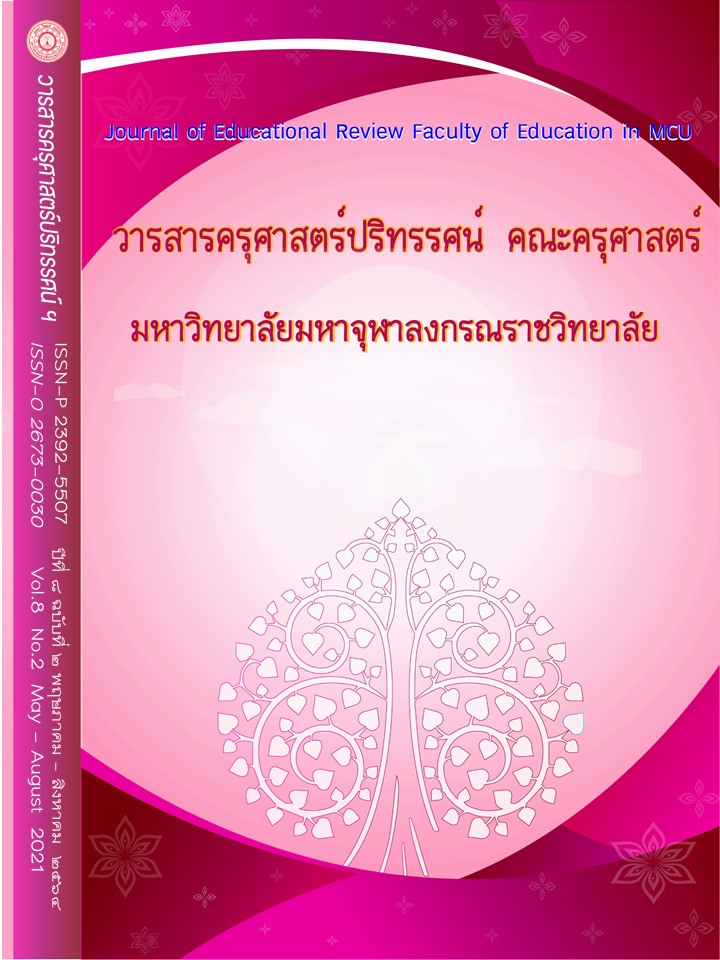THE PROCESS INNOVATION IN BUDDHIST PSYCHOLOGICAL GUIDANCE FOR STRENGTHENING LEARNING AFFECTIVE FOR STUDENTS IN HIGHER EDUCATION OF MAHACHULALONGKORNRAJAVIDYALAYA UNIVERSITY
Main Article Content
Abstract
The purposes of this thesis were 1) to study issues and guidance processes of higher education students, 2) to create process innovation in Buddhist Psychology guidance, and 3) to present and results of process innovation in Buddhist Psychology guidance to strengthen educational attitudes of higher education students in Mahachulalongkornrajavidyalaya University. Quasi-experimental research method was used in 3 parts of data collection: 1) the data collection to study issues and guidance processes of higher education students was used the method of interview in the number of 11 experts, 2) the data collection to create process innovation in Buddhist Psychology guidance used group discussion method in the total 9 persons, and 3) the data collection to present and results of process innovation had 25 experimental samples. This study used data analyses such as frequencies, percentages, mean, and standard deviation. The findings of the study were as follows. 1) Issues and guidance processes of higher education students it found that students did not have knowledge in the field of study, chose the field of study depends on their parents and friends, the number of students decreased, there are not cost of living for studying there. 2) Instructors could not provide ordinary teachings and instruction. The studying and teaching processes and teaching management were not interesting. The number of the counselor was not enough. Guidance process is to help higher education students to have self-immunity in the way of life in views of studying, career, personal and society. Innovation process in Buddhist Psychology guidance to enhance educational attitudes in 3 aspects were to (1) cognitive component such as the importance and objectives of education, (2) affective component such as value, passion, interest and profit of education, and (3) behavioral component such as knowledge, ability, aptitude passion, interest, ambition and good habits in education, and 3) trial results of innovation process in Buddhist Psychology guidance to enhance educational attitudes of higher education students in Mahachulalongkornrajavidyalaya University were revealed that before using the innovative guidance of Buddhist psychology at the overall is high level and after using the innovative guidance at the overall is the highest level.
Article Details
ทัศนะและความคิดเห็นที่ปรากฏในบทความในวารสารฉบับนี้ถือเป็นความรับผิดชอบของผู้เขียนบทความนั้นเพียงผู้เดียว และไม่ถือเป็นทัศนะและความรับผิดชอบของกองบรรณาธิการ
กองบรรณาธิการขอสงวนสิทธิ์ในการคัดเลือกบทความลงตีพิมพ์และจะแจ้งให้เจ้าของบทความทราบหลังจากผู้ประเมินบทความตรวจอ่านบทความแล้ว
ต้นฉบับที่ได้รับการตีพิมพ์ในวารสารครุศาสตร์ปริทรรศน์ คณะครุศาสตร์ มหาวิทยาลัยมหาจุฬาลงกรณราชวิทยาลัย ถือเป็นกรรมสิทธิ์ของคณะครุศาสตร์ มหาวิทยาลัยมหาจุฬาลงกรณราชวิทยาลัย ห้ามนำข้อความทั้งหมดหรือบางส่วนไปพิมพ์ซ้ำ เว้นเสียแต่ว่าจะได้รับอนุญาตจากมหาวิทยาลัยฯ เป็นลายลักษณ์อักษร
References
กฤษณา ประชากุล, อินถา ศิริวรรณ และอำนาจ บัวศิริ. (2562). การพัฒนาการแนะแนวตามหลักพุทธบริหารการศึกษาในระดับมัธยมศึกษา. วารสารมหาจุฬานาครทรรศน์. 6(6). 3092-3110.
ชุติมา ศิริรักษ์. (2559). ชุดกิจกรรมแนะแนวเพื่อพัฒนาทักษะชีวิตของนักเรียนมัธยมศึกษาปีที่ 4. ยะลา: โรงเรียนคณะราษฎรบำรุง.
ณัฐกิจ ขันแกล้ว. (2563). วิเคราะห์สื่อโฆษณาที่มีอิทธิพลต่อการเจริญเติบโตและพัฒนาการของวัย. แหล่งที่มา https://sites.google.com/site/natthakij56/wikheraah-sux-khosna-thi-mi-xiththiphl-tx-kar-ceriy-teibto-laea-phathnakar-khxng-way สืบค้นเมื่อ 20 ธ.ค. 2563.
ดวงเดือน พันธุมนาวิน. (2530). พฤติกรรมศาสตร์เพื่อการพัฒนาจริยธรรมนิสิตนักศึกษา. วารสารศึกษาศาสตร์ปริทัศน์. 3(3). 77-89.
ธงชัย ทองมา และธีระวัฒน์ จันทึก. (2558). การบริหารจัดการความเสี่ยงกับการบริหารการเปลี่ยนแปลง: องค์การในยุคโลกาภิวัฒน์. Veridian E-Journal, Slipakorn University. 8(3). 596-621.
ธนพล บรรดาศักดิ. (2560). ความสุขในการเรียนรู้ของนักศึกษาพยาบาล. วารสารสันติศึกษาปริทรรศน์ มจร. 5(1). 357.
พระธรรมโกศาจารย์ (ประยูร ธมฺมจิตฺโต). (2553). วิธีบูรณาการพระพุทธศาสนากับศาสตร์สมัยใหม่. กรุงเทพมหานคร: มหาวิทยาลัยมหาจุฬาลงกรณราชวิทยาลัย.
พระธรรมปิฎก (ป. อ. ปยุตฺโต). (2546). พจนานุกรมพุทธศาสตร์ ฉบับประมวลธรรม. พิมพ์ครั้งที่ 12. กรุงเทพมหานคร: โรงพิมพ์มหาจุฬาลงกรณราชวิทยาลัย.
พระพรหมคุณาภรณ์ (ป. อ. ปยุตโต). (2549). พุทธธรรม ฉบับปรับปรุงและขยายความ. พิมพ์ครั้งที่ 11. กรุงเทพมหานคร: สหธรรมิก.
มหาวิทยาลัยจุฬาลงกรณราชวิทยาลัย. (2539). พระไตรปิฎกฉบับภาษาไทย ฉบับจุฬาลงกรณราชวิทยาลัย. กรุงเทพมหานคร: โรงพิมพ์มหาจุฬาลกรณราชวิทยาลัย.
วิมลยา เนื้อทอง และคณะ. (2561). การศึกษาระดับความสุขในการเรียนของนักศึกษาชั้นปีที่ ๑ คณะวิทยาศาสตร์และเทคโนโลยี มหาวิทยาลัยราชภัฏนครราชสีมา. วารสารวิจัยมหาวิทยาลัยเทคโนโลยีราชมงคลศรีวิชัย. 10(3). 424-435.
สมนึก เอื้อจิระพงษ์พันธ์. (2553). รูปแบบการพัฒนาความสามารถในการจัดการความรู้ของผู้ประกอบการที่มีนวัตกรรมในประเทศไทย. ดุษฎีนิพนธ์วิทยาศาสตรดุษฎีบัณฑิต. จุฬาลงกรณ์มหาวิทยาลัย.
สายหยุด มีฤกษ์. (2562). การแนะแนวการศึกษาและอาชีพ. พระนครศรีอยุธยา: โรงพิมพ์มหาวิทยาลัยมหาจุฬาลงกรณราชวิทยาลัย.
อภิวัฒน์ บัวลอย. (2556). ประเด็นปัญหา ปัจจัย แนวโน้ม ทิศทาง ทางการแนะแนวและการปรึกษาเชิงจิตวิทยาที่ ควรแก้ไขพัฒนา และแนวทางการแก้ไขพัฒนาทางการแนะแนวและการปรึกษาเชิงจิตวิทยา. วิทยานิพนธ์ศึกษาศาสตรมหาบัณฑิต. มหาวิทยาลัยสุโขทัยธรรมาธิราช.
อัจศรา ประเสริฐสิน และคณะ. (2560). การศึกษาแนวทางการจัดการนวัตกรรมทางการศึกษาไปใช้ในการพัฒนาการเรียนการสอนและการทำวิจัยของครู. วารสารบรรณศาสตร์ มศว. 10(2). 80.
Dillon, R. W., & Kuman, J. V. (1998). Research in Education. 8th ed. Boston, MA: Ally and Bacon.


